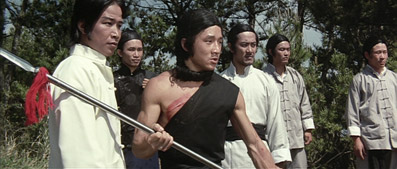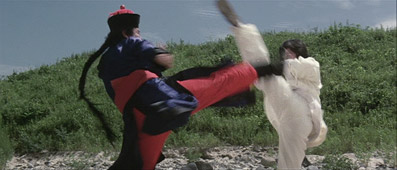|
In
kung-fu movies, there are few crimes more heinous than betraying
the Shaolin temple in which you trained, unless it's killing
your master and wiping out his pupils. One thing's for
sure, you'll never get them all, and one will always survive
and dedicate the rest of his life to hunting you down and
opening an industrial sized can of whoop-ass on you.
Such
is the set-up for Hand of Death – aka Countdown in Kung Fu, aka Shao Lin Men –
in which pure-of-heart Yun Fei is charged with the dual
task of aiding a courier named Zhang Yi, who is carrying
a map that will aid forces rebelling against the repressive
Qing government, and hunting down Shih Shao Feng, the ex-pupil
responsible killing just about everyone associated with
the Shaolin teachings. It won't be easy. Despite Yun Fei's
finely developed skills, Shih Shao Feng has developed a
fighting technique known as Deadly White Crane Fist and
has surrounded himself with a group of fearsome warriors
with varying fighting styles, men who are known collectively as the Eight Tigers.

Yun
Fei's quest takes him into an area known as the Foreign
Zone, which he quickly discovers is a region hostile to nosey
people and Shaolin priests alike. Here he meets up with
Tan Feng, a simple woodsman with a skill for honing weaponry
and spear fighting and who harbours a personal grudge against
two of Shih Shao Feng's cronies for killing his brother.
The
plot to this point holds no surprises, at least for anyone
with even a passing knowledge of a genre in which narrative
invention is a rare and peculiar thing. The performances,
however, are surprisingly and pleasingly low key, the initial
meeting of Yun Fei and Tan Feng an almost wordless encounter
in which an understanding is reached through
an exchange of looks and telling facial expressions. This is all the
more impressive when you consider that Feng is played by
a young Jackie Chan, who turns in here what must rank as
one of the most underplayed performances of his career.
The
narrative trips along in familiar fashion, with Yun Fei
given a pounding by Shih Shao Feng and the Eight Tigers,
then freed from torture by Tan and united with two more Shaolin
students and a swordsman with a past who is known as The Wanderer
(although he's credited in the cast list as 'Zorro'). Yun Fei
trains up and develops a Tiger Claw move that just might
work against the Deadly White Crane Fist, while Tan Feng
sets about reforging The Wanderer's sword and making sturdy
weapons for himself and Yun Fei. That it's all building to a
final confrontation with Shih Shao Feng and his boys is a given – what does catch you out is how early it kicks off, with the entire final third of the film devoted to a series
of extended and energetically staged battles with a variety
of weapons, including spears, swords, feet and fists.
The
cast is certainly a major draw here, with Yun Fei played
by Tan Tio-Liang, aka 'Flash
Legs', and a support cast that features Jackie
Chan, Sammo Hung, James Tien and Yeun Biao. Adding to the
mix is a director named Wu Yu-Sheng, better known to Hong
Kong cinema aficionados as John Woo. This is Woo before
the recognisable John Woo style was even half formed, but
in the handling of the performers and some of the smarter
camera angles, he still manages to stamp a degree of individuality
on the Golden Harvest house style (he also has an acting
role as Scholar Cheung.).

Sammo
Hung's fight choreography varies a little at first – there
is a bit too much rehearsal kung-fu in the opening assault
– but things really pick up when Chan, Hung, Biao and Swordsman
Paul Chang get to work, and the final half-hour of almost
unbroken action should be enough to put a satisfied smile
on the face of any true genre fan. Although not packing
quite the eye-opening wallop that the combined force of much talent
might lead you to expect, Hand of Death
is still a solid and engaging genre piece, uncharacteristically
(and pleasingly) restrained in its dramatic elements but
delivering the martial arts goods with energy and style.
This
is one of the first of two titles released under Hong Kong
Legends' new 'Ultrabit' label (the other is Jackie Chan's
1979 directoral debut, Fearless
Hyena). The transfer certainly holds true to
its promise – dipping in regularly, I rarely saw the bit
rate drop below 9.5 and it frequently pips at 10, the maximum
possible. The picture quality certainly reflects this, at
least in shots of bright exteriors, where the colours are rich
without over-saturation and the detail level is very impressive,
although this has been achieved in part through some visible
edge enhancement. Night scenes fare slightly less well.
Detail is still very good, but the contrast sometimes greys
out a bit with with black levels and shadow detail lost.
There's also the odd example of highlights whiting out in
the brighter scenes, but there's hardly a dust spot in sight,
and only the odd flicker of repaired damage. On the whole, it's
a very fine transfer for a film of its age and origin. Whether
it offers a significant step up for Hong Kong Legends' already
high standards is another matter, and a cynical person might
just suggest that the 'Ultrabit' label might be used primarily
for titles that have no extra features, as you could argue
that there simply is no room for them at this stonkingly
high bit rate.
The
original Mandarin mono 2.0 track is joined by a Mandarin
5.1 surround remix and a 5.1 English dub. All tracks show
their age in terms of their dynamic range and a slight hiss
hovering in the background, but the separation on the 5.1
remix is well done without messing up the integrity of the
original. The English track is comical stuff, with what
sounds like English voice artists attempting to fake gruff
American accents of no specific region.
At
first glance there's nothing on offer – there's no button
to press for Special Features on the main menu, the space
taken up on the disc by the Ultrabit transfer no doubt an
argument for their non-inclusion. But nip into the Languages
section and sitting at the bottom you'll find
the word 'Commentary'. No information on who it's by, but
you select it anyway and you get:
Bey
Logan Commentary
As fans will know, Bey Logan and Hong Kong Legends some
time ago parted company, leaving a hole that no-one has
yet managed to satisfactorily fill. To have a release
that includes a commentary by Logan seems reason for celebration,
so quite why it's stuck away unannounced in the languages
section is beyond me (a colleague suggested it was the DVD
extras equivalent of being miffed at Logan for leaving –
he may be right). It seems unlikely that Logan has temporarily
rejoined HKL and probable that this was recorded before
his departure – either way, it's well up to his usual high
standards, crammed with information about the actors, the
technical details and the fighting styles used, and sprinkled
with the usual interesting collection of insider anecdotes.
A welcome and essential companion to the film.
There
are also the usual collection of Trailers
for other HKL releases.
Another
worthwhile rediscovery by Hong Kong Legends, gorgeously
cleaned up and impressively transferred, and having the
extra bonus of a Bey Logan commentary. It may be one for
the martial arts fans only, but to them it comes recommended,
in part for the fascination of seeing that cast united with
that director, and all so early in their careers.
|